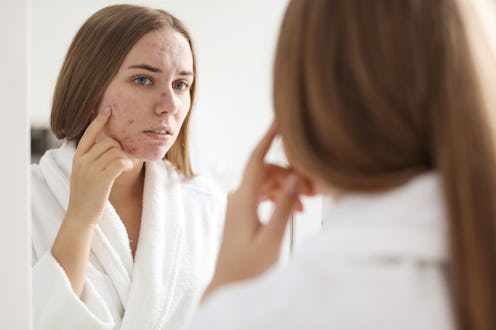Style
Conglobata Is One Of The Most Extreme Forms Of Acne — So Why Isn't It Talked About?

A high percentage of people have experienced acne at least once in their lives, so it's no wonder that breakouts are a regular talking point. But there's a particularly severe form of acne that's not as frequently discussed. In fact, most people have never heard of it. And although this inflammatory type is uncommon, the lack of awareness surrounding it can deeply affect people So what is acne conglobata?
Instagram has welcomed a wave of skin positivity influencers. Acne is, unsurprisingly, their main topic of conversation. But only a handful of users openly discuss acne conglobata and its treatment regime.
20-year-old Mariah is one of them. As she explained to BBC Bitesize, her childhood acne became much worse when she was 19. "It got to the point where I couldn't sleep because if I laid my face down, it would hurt too much," she told the BBC. "I couldn't even smile or open my mouth to eat food without it hurting."
Similarly, 17-year-old Constanza Hernández Concha details her experiences with the condition. "It was always hard for me to control my acne at school," she told Love What Matters. "Very often, my skin would stretch out to the point where it would break and stain my clothes, desk, and exams with blood and pus." Insensitive comments from other students were common.
It's clear that acne conglobata takes a toll on a person's everyday life. But what is this barely mentioned form of acne?
Who is likely to be affected by acne conglobata?
"Acne conglobata is a very rare, but severe form of acne," explains Dr Emma Wedgeworth, consultant dermatologist and spokesperson for the British Skin Foundation. Although it's mainly seen in men, women can be affected too. "Particularly [women] who have high levels of testosterone in their bodies," notes Dr. Kemi Fabusiwa, founder of Joyful Skin. (Conditions such as polycystic ovary syndrome may be an underlying cause.)
"Other things that put you at risk of acne conglobata include thyroid medication, anabolic steroids, and tumours that secrete [hormones like testosterone]," Dr. Fabusiwa continues. An autoinflammatory disorder may also cause this acne form in some people, reports Healthline. But, as Dr. Wedgeworth states, "no one quite knows why some people get this type of acne." However, she adds "there may be a genetic tendency."
What are the signs and symptoms?
"Deep cysts, multiple deep blackheads, and abscesses which occur on the face, back, chest, and buttocks" characterise acne conglobata, says Dr. Wedgeworth.
As Healthline notes, it is a form of nodulocystic acne. Nodules form deep under the skin when clogged pores harden, resulting in a solid lump. Cysts, on the other hand, are lumps filled with fluid. Ones containing pus, known as abscesses, "can pop and leak foul-smelling" fluid, says Dr. Fabusiwa.
As well as causing numerous bumps that appear to be linked together, acne conglobata can lead to red, swollen skin in the surrounding areas. It also tends to result in significant scarring.
How is acne conglobata treated?
Treating acne conglobata isn't easy. "It is important to see your doctor as soon as you suspect acne conglobata to reduce the risk of permanent scarring," Dr. Fabusiwa explains. "Over-the-counter products and even topical medications won’t be enough to tackle this form of acne on their own, which is why it is so important for you to be referred to your dermatologist early."
Oral medications are frequently prescribed, including isotretinoin (known by the brand name Roaccutane), antibiotics, and steroids, notes Dr. Wedgeworth. "But some cases may require more specialised treatments like monoclonal antibody injections." Topical formulas may be used in conjunction with these treatments, per Healthline, to help reduce inflammation and remove the dead skin and oil that clogs up pores. Sometimes, the contraceptive pill or other hormonal medication is prescribed.
Roaccutane is usually the most effective method, but can come with a number of side effects. As the NHS states, these include increased sensitivity to sunlight and dry skin, eyes, nose, and throat.
What is the long-term outcome?
The earlier you seek treatment, the less likely you are to experience severe scarring and skin disfiguration. However, people with acne conglobata may still notice scars and dark marks after nodules and cysts heal. These can be treated with the help of a dermatologist.
As this is a chronic condition, people may experience outbreaks throughout early adulthood and potentially into their 30s, Healthline reports. It's therefore just as important to take care of mental wellbeing as well as the physical side.
Dr Fabusiwa says: "Remember, although severe, this skin problem does have solutions. It won’t happen overnight but huge improvements can be made in the long run."